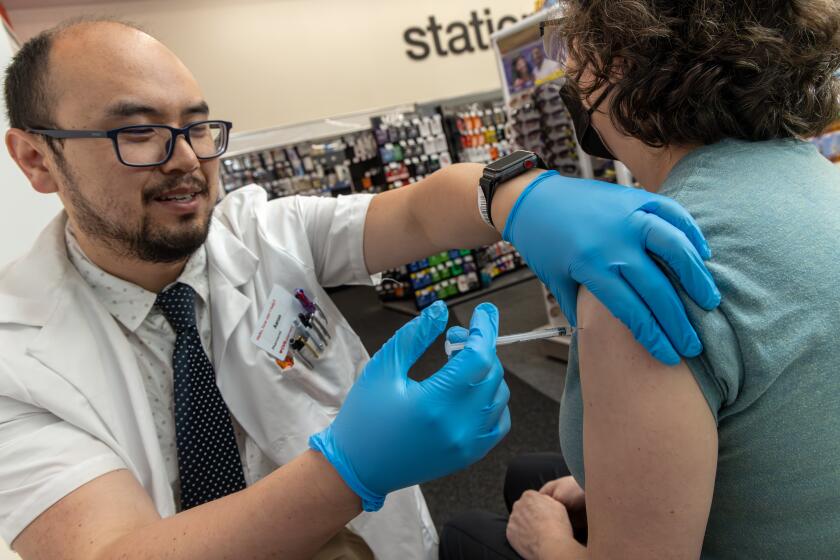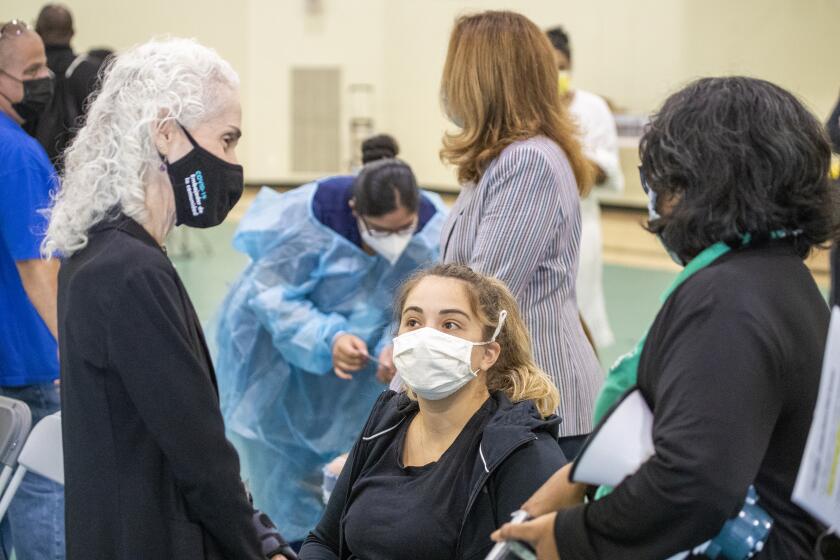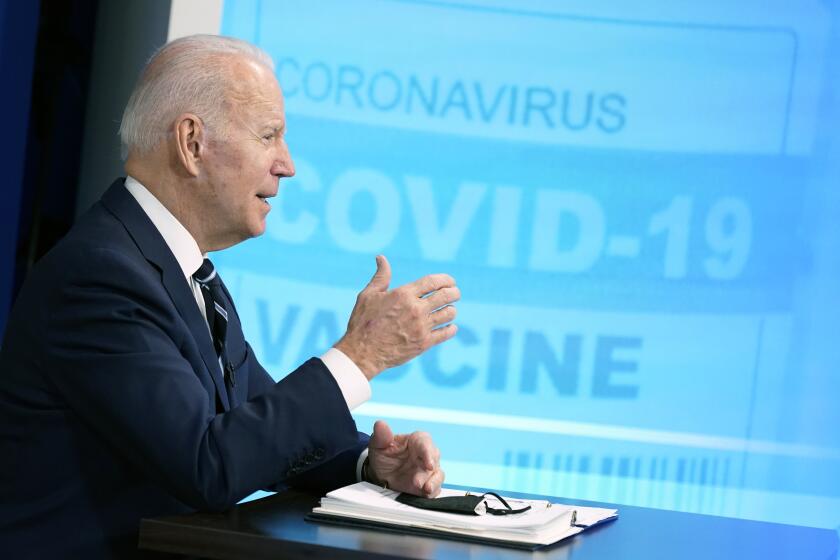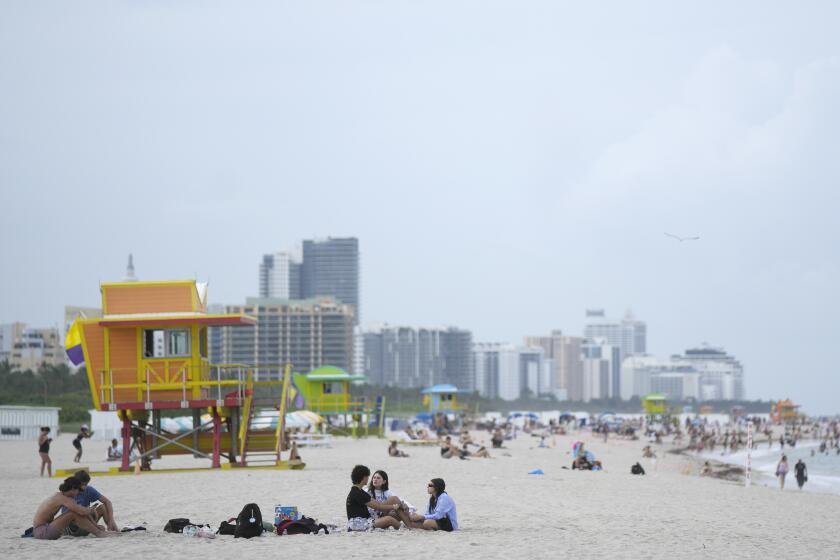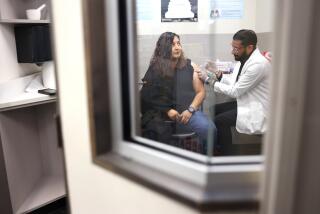What you need to know as fall vaccinations against COVID, flu and RSV get underway

WASHINGTON â Updated COVID-19 vaccines may be getting a little easier for adults to find, but theyâre still frustratingly scarce for young children. Health officials said last week that shots for children have started shipping â and reminded most everyone to get a fall flu shot too.
About 2 million Americans have gotten the new COVID-19 shot in the weeks since its approval despite early barriers from insurance companies and other glitches, according to the Department of Health and Human Services.
For the first time, the U.S. has vaccines to fight a trio of viruses that cause fall and winter misery. But health officials worry that shot fatigue and hassles in getting them will leave many people needlessly unprotected.
âWe need to use them,â Dr. Mandy Cohen, director of the Centers for Disease Control and Prevention, said last week. âRight now is the right time.â
The new COVID shot is available at CVS and Walgreens at no cost through most insurers. But Kaiser enrollees must wait until Sept. 28 to avoid paying out of pocket.
A flu vaccination and the updated COVID-19 shot are urged for just about everyone, starting with babies as young as 6 months.
Also this year, a vaccine against another scary illness called respiratory syncytial virus is recommended for people 60 and older and for certain pregnant women. And for babies, a vaccine-like medicine to guard against RSV is expected to arrive next month.
âThese vaccines may not be perfect in being able to prevent absolutely every infection with these illnesses, but they turn a wild infection into a milder one,â said Dr. William Schaffner of Vanderbilt University and the National Foundation for Infectious Diseases.
Here are some things to know about the new crop of shots:
Why do I need another COVID-19 shot?
This yearâs vaccine is updated to protect against newer versions of the constantly evolving corona-virus. Already thereâs been a late summer jump in infections, hospitalizations and deaths. And so far the new vaccine recipe appears to be a good match to the variants currently circulating.
Itâs possible the Eris subvariant, formally known as EG.5, may have even further immune-escape advantage than other members of the Omicron coronavirus family.
Protection against COVID-19 wanes over time â and most Americans havenât had a vaccine dose in at least a year. Everyone 5 and older will need just one shot this fall even if theyâve never had a prior vaccination, while younger children may need additional doses depending on their vaccination and infection history.
How hard is it to find COVID-19 shots?
The rolloutâs start has been messy. This time the government isnât buying and distributing shots for free. Now drugstores, doctorsâ offices and other providers had to place their own orders, and sometimes canceled appointments if supplies didnât arrive in time. Some people had to wait for their insurance companies to update the billing codes needed to cover them or risk paying out of pocket.
Manufacturers Pfizer and Moderna have shipped millions of doses, and say thereâs plenty of supply â and in recent days, more appointments have started opening, at least for people 12 and older. In a meeting last week, insurance companies told U.S. Health Secretary Xavier Becerra that theyâve largely resolved the paperwork issues blocking some patientsâ vaccinations.
The shots are supposed to be provided free in-network to the insured. For the uninsured or underinsured, the CDC has opened what itâs calling a âbridgeâ program to provide free shots at certain sites.
Why canât parents find COVID-19 shots for younger kids?
Adult doses got shipped first, Cohen said. Doses for the under-12 set have begun shipping, and âthe supply is filling out,â she said.
Drugstore chain CVS said its doses for ages 5 and older began arriving recently, although supplies vary by location. Its MinuteClinic locations anticipate opening appointments for kids as young as 18 months in the coming days.
LAUSD may have been among the last public school systems to repeal its COVID vaccine mandate. Officials are making no apologies.
As for pediatricians, theyâve had to guess how many doses to buy upfront while waiting to learn how much insurance companies would reimburse them for each shot, said Dr. Jesse Hackell of the American Academy of Pediatrics. He said that early parent demand is heartening but that pediatricians expect to spend lots of time this fall explaining to hesitant families how important COVID-19 vaccination is even for healthy children.
In Redmond, Wash., Ania Mitros got herself, her husband and her 13-year-old vaccinated pretty easily, but despite calls to multiple pharmacies and clinics, canât find anyone to tell her when shots for her 8- and 11-year-old will be available.
âThere need to be clear expectations,â she said.
What about the flu vaccine?
Fewer Americans got a flu vaccine last year than before the pandemic â a discouraging gap that the CDC hopes to reverse.
The White House says President Biden has gotten the updated COVID-19 vaccine and the annual flu shot.
People need a flu vaccine every fall because influenza also mutates each year. Like with COVID-19, flu is most dangerous to older adults, the very young and people with weak immune systems, as well as those with lung, heart or other chronic health problems, or who are pregnant.
There are multiple kinds of flu vaccines, including a nasal spray version for certain younger people. More important, three kinds are specifically recommended for seniors because they do a better job of revving up an older adultâs immune system.
Can I get a flu shot and COVID-19 shot at the same time?
Yes, although one in each arm might be more comfortable.
Who needs the new RSV vaccine?
RSV is a cold-like nuisance for most people, and not as well-known as the flu. But RSV packs hospitals every winter and kills several hundred young children and thousands of seniors. The CDC says that RSV cases already are rising in the Southeast.
A Centers for Disease Control and Prevention health advisory notes elevated cases of respiratory syncytial virus in parts of the Southeastern U.S.
RSV vaccines from GSK and Pfizer are approved for adults 60 and older.
Drugstores have adequate supplies, but some seniors are reporting hurdles such as requirements to get a prescription. Thatâs because the CDC recommended that seniors talk with their doctors about the new vaccine. Cohen said it was meant just for education about a virus that people may not know much about.
âWe want folks to ... get access to the vaccine as quickly as possible,â she said.
What about babies and RSV?
The FDA also has approved Pfizerâs RSV vaccine to be given late in pregnancy so moms-to-be pass virus-fighting antibodies to their fetuses, offering some protection at birth. The CDC is recommending that pregnancy vaccinations be offered between September and January, when RSV tends to be most common.
Thereâs no vaccine for children, but babies whose mothers didnât get vaccinated in pregnancy may get an injection of lab-made antibodies to guard against RSV. Called Beyfortus, the one-dose shot from Sanofi and AstraZeneca is different than a vaccine, which teaches the body to make its own infection-fighting antibodies, but is similarly protective. Cohen said it should be available in October.
